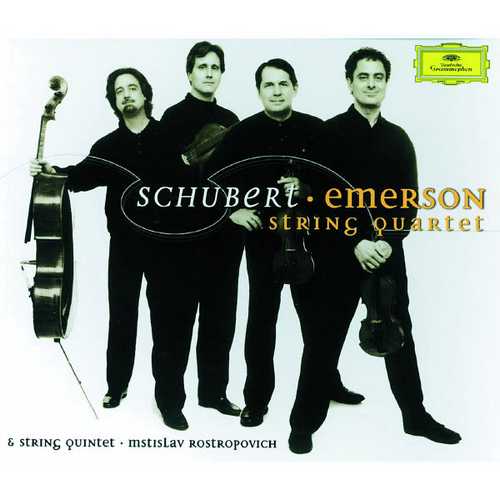
Composer: Franz Peter Schubert
Performer: Emerson String Quartet
Number of Discs: 3
Format: FLAC (tracks)
Label: Deutsche Grammophon
Catalogue: E4591512
Release: 1999
Size: 783 MB
Recovery: +3%
Scan: cover
CD 01
String Quartet No. 13 in A minor, D804 ‘Rosamunde’
01. 1. Allegro ma non troppo
02. 2. Andante
03. 3. Menuetto (Allegretto)
04. 4. Allegro moderato
String Quartet No. 14 in D minor, D810 ‘Death and the Maiden’
05. 1. Allegro
06. 2. Andante con moto
07. 3. Scherzo (Allegro molto)
08. 4. Presto
CD 02
String Quartet No. 15 in G Major, D887
01. 1. Allegro molto moderato
02. 2. Andante un poco mosso
03. 3. Scherzo (Allegro vivace)
04. 4. Allegro assai
String Quartet No. 12 in C minor (fragment), D703 ‘Quartettsatz’
05. Allegro assai
06. Andante – Allegro assai
CD 03
String Quintet in C major, D956
01. 1. Allegro ma non troppo
02. 2. Adagio
03. 3. Scherzo (Presto) – Trio (Andante sostenuto)
04. 4. Allegretto
Deutsche Grammophon’s affordable Trio series revives great recordings from the past, many long unavailable and coveted by collectors. Yet this 2004 triple-disc set of Schubert’s late string quartets and the Quintet in C major, performed by the Emerson String Quartet and Mstislav Rostropovich, is identical to the 1999 release in all respects except for packaging and price, and will be superfluous to owners of the first edition. That said, the performances are largely praiseworthy, and the digital sound is still extraordinary. These are fairly extroverted interpretations of the quartets, and the players are at their best in fast movements, where their clarity, impeccable execution, and physical prowess are always apparent.
The Emerson is less convincing in the slow movements, and Schubert’s deepest expressions seem instead somewhat rarefied and remote. The Quintet presents the greatest test of this ensemble’s technical abilities, cohesion, and capacity for emotional depth. The group plays with exciting vigor, resonant sonority, and coherence in the Allegro ma non troppo, Scherzo, and Allegretto, and though its tone is rough at times, this brusqueness mostly works. However, the sublime Adagio and the Scherzo’s transcendental Trio fall short of being compelling and profound, and Schubert’s most moving music seems to have stymied these musicians, despite their best efforts.